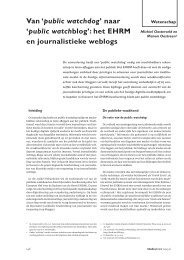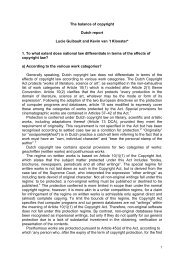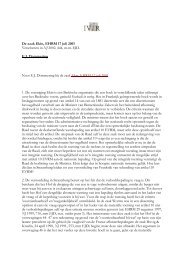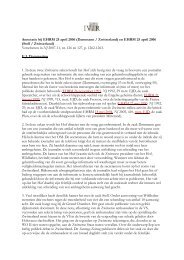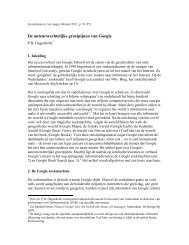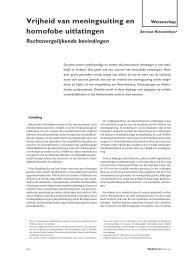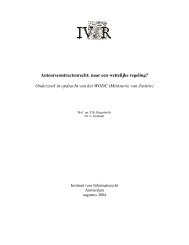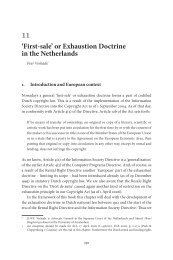unravelling the myth around open source licences - IViR
unravelling the myth around open source licences - IViR
unravelling the myth around open source licences - IViR
Create successful ePaper yourself
Turn your PDF publications into a flip-book with our unique Google optimized e-Paper software.
under <strong>the</strong> ‘unreasonably onerous’ test of article 6:233 CC. Essential terms in a contract will <strong>the</strong>refore<br />
be binding upon <strong>the</strong> parties unless, however, given all relevant circumstances, <strong>the</strong>ir enforcement{ XE<br />
"Enforcement:of contract" } would be unacceptable according to <strong>the</strong> criterion of reasonableness and<br />
equity as laid down in article 6:248 CC. 167<br />
What is <strong>the</strong> core stipulation of <strong>the</strong> GPL, <strong>the</strong> BSD or <strong>the</strong> Mozilla Publis Licence? According to<br />
<strong>the</strong> case law, <strong>the</strong> main subject matter of <strong>the</strong>se <strong>open</strong> <strong>source</strong> licence would be restrictly limited to <strong>the</strong><br />
delivery of <strong>the</strong> software, free of charge. In our opinion, <strong>the</strong> limitation of liability, <strong>the</strong> disclaimer of<br />
warranty, <strong>the</strong> obligation to disclose <strong>the</strong> <strong>source</strong> code, to distribute modifications of <strong>the</strong> code under <strong>the</strong><br />
GPL, to put a copyright notice with <strong>the</strong> names of all authors, or <strong>the</strong> prohibition to ask for royalties<br />
would in all likelihood fall outside <strong>the</strong> category of ‘essential term’ of <strong>the</strong> <strong>licences</strong>. Although <strong>the</strong>se<br />
stipulations may all be very important for any software developer who decides to distribute his<br />
product under <strong>the</strong> terms of an <strong>open</strong> <strong>source</strong> licence, <strong>the</strong> fact that <strong>the</strong>y are important has no influence<br />
on <strong>the</strong> determination of <strong>the</strong> main subject matter of <strong>the</strong> licence. The Supreme Court once ruled that,<br />
even if a party argues that a particular stipulation is essential for <strong>the</strong> achievement of its goals and that,<br />
at <strong>the</strong> time of <strong>the</strong> conclusion of <strong>the</strong> contract, it had mentioned to <strong>the</strong> o<strong>the</strong>r party that this stipulation<br />
was not <strong>open</strong> to negotiation, it does not make this term a core stipulation in <strong>the</strong> sense of article<br />
6:231a CC. 168 If <strong>the</strong> terms of <strong>the</strong> GPL, <strong>the</strong> BSD, or <strong>the</strong> Mozilla Public Licence were submitted to <strong>the</strong><br />
appreciation of a Dutch court, it is quite probable that <strong>the</strong> court would come to a similar conclusion<br />
as <strong>the</strong> Supreme court in <strong>the</strong> case mentioned above regarding, for example, <strong>the</strong> share-alike clause, <strong>the</strong><br />
obligation to make <strong>the</strong> <strong>source</strong> code available, or <strong>the</strong> prohibition to charge royalties.<br />
4.3.3 Standard form contracts<br />
The use of standard form contracts, or general conditions of sale, is fur<strong>the</strong>r governed by<br />
articles 6:231 to 6:247 of <strong>the</strong> Dutch Civil Code. 169 As a rule, article 232 CC states that ‘<strong>the</strong> o<strong>the</strong>r<br />
party is bound by <strong>the</strong> standard form contract even if, at <strong>the</strong> time of entering into <strong>the</strong> contract, <strong>the</strong><br />
user understood or ought to understand that <strong>the</strong> o<strong>the</strong>r party did not know <strong>the</strong> content of <strong>the</strong><br />
conditions’. 170 Since <strong>the</strong> adoption of <strong>the</strong> new Dutch Civil Code in 1992, it is generally assumed that<br />
general conditions of sale can be accepted in <strong>the</strong>ir entirety. The intention to enter into contract no<br />
longer needs to be directed to <strong>the</strong> content of <strong>the</strong> general conditions, but ra<strong>the</strong>r to <strong>the</strong> applicability of<br />
<strong>the</strong> set of conditions as a whole to <strong>the</strong> actual transaction. When <strong>the</strong> applicability of a set of standard<br />
terms is accepted, <strong>the</strong> o<strong>the</strong>r party cannot invoke <strong>the</strong> fact that he was not aware of <strong>the</strong> content of <strong>the</strong><br />
terms. 171 This relates to <strong>the</strong> general doctrine of offer and acceptance, examined in section 4.3.1<br />
above. The key question in this case is whe<strong>the</strong>r <strong>the</strong> o<strong>the</strong>r party understood or must have understood<br />
that, by clicking in a box ‘I agree’ or performing a certain act, he accepted <strong>the</strong> applicability of <strong>the</strong><br />
standard form contract. 172 For this, however, this o<strong>the</strong>r party must have been given sufficient<br />
opportunity to take cognizance of <strong>the</strong> general conditions during or before <strong>the</strong> formation of <strong>the</strong><br />
contract.<br />
General conditions may be annulled if <strong>the</strong>y are unreasonably onerous because of <strong>the</strong>ir content,<br />
or because <strong>the</strong> user has not given <strong>the</strong> o<strong>the</strong>r party a reasonable opportunity to take notice of <strong>the</strong><br />
167 Art. 6:248(1) CC reads as follows: ‘A contract has not only <strong>the</strong> juridical effects agreed to by <strong>the</strong> parties, but also those which,<br />
according to <strong>the</strong> nature of <strong>the</strong> contract, result from <strong>the</strong> law, usage or <strong>the</strong> requirements of reasonableness and equity.’<br />
168 HR 21 February 2003, NJ 2004/567, § 3.4.3.<br />
169 The requirement regarding <strong>the</strong> content of standard form contracts derive from <strong>the</strong> Directive on Unfair Terms in Consumer<br />
Contracts, 93/13/EEC, of 5 April 1993, O.J. L 95/29. In <strong>the</strong> context of <strong>open</strong> <strong>source</strong> <strong>licences</strong>, <strong>the</strong> provisions of this directive<br />
are mostly relevant for questions of guarantees and termination of contract.<br />
170 Van Esch 2004, p. 181.<br />
171 Memorie van Toelichting, Parlementaire Geschiedenis, InvW 6, p. 1573.<br />
172 Berghuis 2005, § 2.2.1.<br />
45



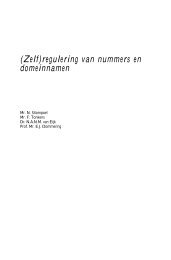
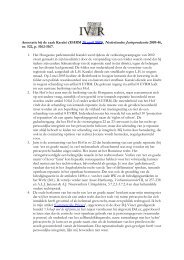
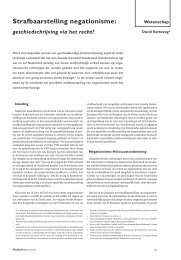
![Legal Opinion of Professor Egbert Dommering [1] concerning ... - IViR](https://img.yumpu.com/23603085/1/184x260/legal-opinion-of-professor-egbert-dommering-1-concerning-ivir.jpg?quality=85)
